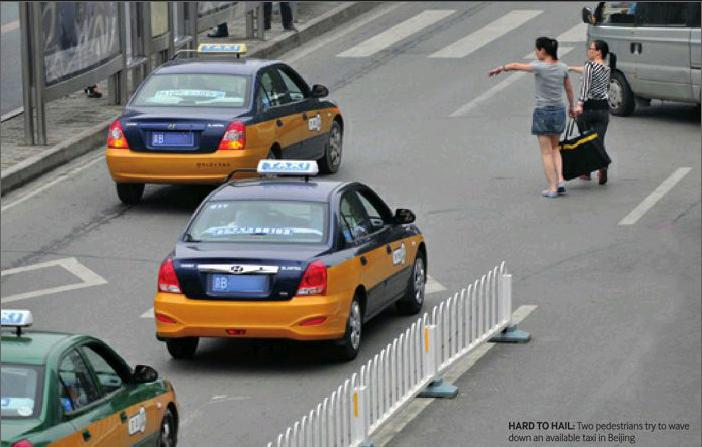Has the Free Market Failed the Taxi?
2014-07-28

Need a taxi? Theres an app for that. More and more cab drivers in China are using app-based taxi booking to supplement their business. Popular applications used include Didi Dache and Kuaidi Dache, which are owned by Chinese Internet giants Tencent and Alibaba, respectively. According to iResearch, the number of customers using these taxi-calling apps numbered 100 million in the first quarter of this year.
Due to their popularity, the government is stepping up efforts to rein in the applications. The Ministry of Transport is now considering creating a unified cab-booking platform integrating taxi-finding apps, phone services and websites. The platform will be able to transfer all the call requests from various sources to one terminal in a taxi.
Such a decision drew wide attention from the public. Some say the transport ministry is interfering too much while others say such strengthened management and oversight is necessary to prevent taxi drivers from refusing customers service.
Furthermore, in regards to complaints about taxi drivers checking apps to receive orders while driving, the ministry maintained that they are not allowed to use phones or devices while operating a vehicle. This constitutes endangering the safety of others on the road. Also mentioned was that those drivers who accept customers orders but fail to pick them up would be disciplined for refusing service.
As for the constantly changing subsidy policy of taxi-calling app companies, the statement says these companies should inform the city transport department 10 days before modifying a subsidy standard, and should alert the public five days ahead.
The ministry has solicited public opinions on this move and suggestions and comments were encouraged to be submitted to the ministry. The following are excerpts of the opinions:
Gang Feng (www.gmw.cn): An integrated service such as that suggested by the ministry would only impede technological innovation and progress. In recent years, smartphones, intelligent glasses, watches and these terminals have developed quickly and can now be used for services like booking taxis. A unified platform would hinder the development of such devices and therefore reduce Chinas competitiveness in the international market.
A unified platform would also threaten fair competition. At present, the government manages the service which uses phones to call taxies. Should the unified platform be established, taxi-booking apps and the cab-calling phone platform would be competing on the same system—making the fair competition principle hard to be observed, as the government would be more likely to favor phone services.endprint
From the customers standpoint, the unified platform weakens the user experience, stripping it of the convenience of taxi-calling apps. Integrating all these services would transform the original C-to-C platform to a C-to-G-to-C platform, reducing the efficiency of taxi-calling apps.
Finally, this unified system also runs the risk of leaking personal information. It amasses customer data into one giant collection, meaning any loophole or digital weakness could result in large-scale personal information leakage, irreparably damaging user privacy.
Zhou Junsheng (Wuhan Evening News): Taxi-calling apps have faced fierce controversies since their inception, especially when subsidies offered by Tencents Didi Dache and Alibabas Kuaidi Dache interrupted the original order of the taxi market. Customers who didnt know how to use these apps complained that they couldnt hail a taxi as drivers refused to pick them up—instead giving preference to those who used the apps—in order to receive a 5-20 yuan ($0.8-3.2) subsidy per ride.
However, if the unified platform is established, the in-car terminals for Didi Dache and Kuaidi Dache would have to be integrated into the governments unified platform. Thus, the core technology possessed by the two companies that developed them would become a public resource; the companies rights would be infringed upon. This integration would likely be acting far beyond the governments authority.
Free and open competition should be allowed in the taxi market, including using both price cuts and technological innovation to woo more customers. It is the result of market competition that taxi-booking apps have won over customers by offering better deals. However, instead of actively utilizing new technology to maintain their customer bases, some traditional companies are petitioning the government to strengthen supervision of their opponents, indicating that they have come to rely on government protection to stay afloat. Such safeguarding will hamper the healthy development of the taxi business and make it impossible for customers to enjoy bonuses like price cuts, which only arise out of free competition.
The Ministry of Transport only needs to supervise the illicit use of cab-hailing apps and shouldnt interfere with the operation of the companies that develop them. In fact, transport authorities should provide more assistance for the promotion of taxi-calling apps rather than interfering with their platform or usage. Serving the people should be the common pursuit of authorities, drivers, and app developers alike.endprint
Tang Wei (Shenzhen Special Zone Daily): Cab-calling apps have been warmly welcomed by both passengers and drivers, so it follows that the government should be rational and cautious in dealing with such a modern phenomenon.
In New York City, the government had prevented the use of such apps at their advent. However, as the ban violated the interests of a majority of people, courts finally granted legal status to the applications. When the government took proper measures to guide their operation, market order was well maintained.
Taxi-calling apps are on the rise, too, because they represent the latest development in Internet technology and the irresistible trend toward artificial intelligence. Should the government choose not to recognize this movement and forbid such innovation, it would go against the convention of the times.
Finally, as an offspring of the market economy, taxi-calling apps should be allowed to exist so long as they do not violate relative laws and regulations. The government should regulate their usage lightly; too much interference will violate market rules and harm fair competition.
Qiu Baochang (news.xinhuanet.com): Cab-hailing apps are intended to do one thing: Facilitate getting a taxi. However, in reality, they have made it more difficult to get a ride for those who dont know how to use them. It is understandable that the government would take measures to regulate the market in order to let fair competition play its role. However, before taking regulatory measures, the government should do its due diligence, researching the market and hearing the publics opinion in order to make a more open and transparent decision. Using legislation to protect its own interests should be avoided at all costs.
The transport ministry did not predict that taxi-calling apps would have such a big influence on the transportation market, thus took action only after the companies behind these applications had invested in them heavily. Passing such a statement, then, in just two weeks is far too hasty. Numerous discussions should be conducted to render several versions of such a plan, with the public left to choose among them.
To ultimately solve the difficulty of waving down a taxi, integrating cab-hailing apps is far from enough. The government should aim instead to address the fundamental problems behind it.endprint
